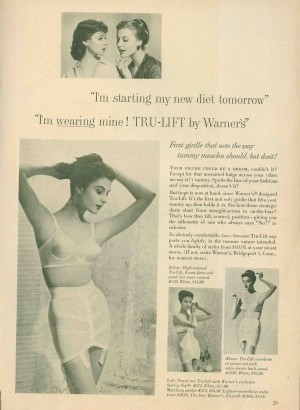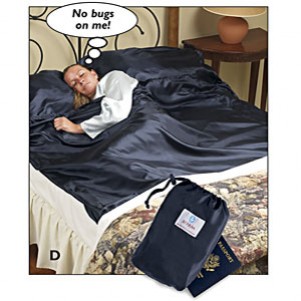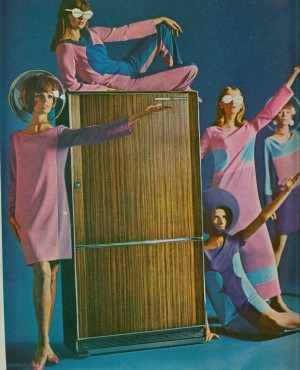Food
Worst. Crackers. Ever!
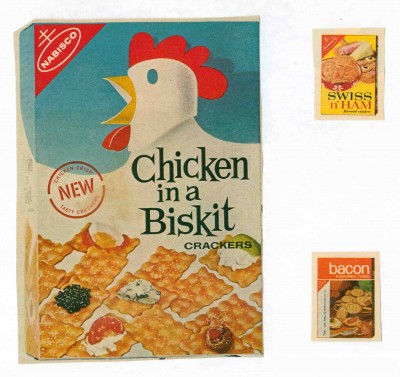
Posted By: Paul - Thu Aug 21, 2008 -
Comments (20)
Category: Animals, Business, Products, Food, Inventions, Stupidity, 1960s
Cornman
When every legitimate superhero property has finally been brought to the screen, perhaps we'll see a remake of CORNMAN.
Posted By: Paul - Wed Aug 20, 2008 -
Comments (12)
Category: Food, Humor, Parody, Movies, Science Fiction, Superheroes
Bonomo’s Turkish Taffy
For no perceptible reason, I woke up this morning thinking about Bonomo's Turkish Taffy, a childhood treat I have not pondered in decades. After waxing nostalgic (despite Nostalgic's objections to being waxed), I began to wonder:If this candy were still being manufactured today, would its allusively Muslim name doom it?
Posted By: Paul - Tue Aug 19, 2008 -
Comments (5)
Category: Food, Pop Culture, Advertising, 1950s, 1960s
Follies of the Mad Men #10
[From Good Housekeeping for December 1958]Here's part of the reason why we're a nation of fatties today. "Lose weight the hard way? No thanks! I'll just compress my flab and strap it in with manmade materials!"
And why is it that the only women ever shown in girdle ads are already so trim and underweight that they aren't the real customers?
Posted By: Paul - Mon Aug 11, 2008 -
Comments (10)
Category: Business, Advertising, Products, Fashion, Food, Torture, Fetishes, 1950s, Women
Magic Cheese Chips
They admit it's "decidedly unusual," but I think it would sure beat stuffing envelopes. "Simply drop into hot grease and they're ready to eat -- big, tasty, crispy, delicious!" Question: What makes them magic?From the July, 1934 issue of Modern Mechanix. (via J-Walk)
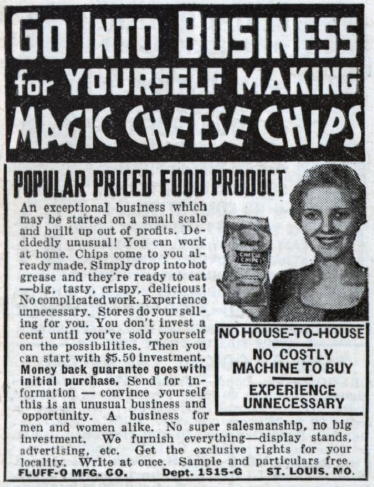
Posted By: Alex - Tue Aug 05, 2008 -
Comments (3)
Category: Business, Advertising, Food, 1930s
The White Castle Experiment

However, the idea of conducting a fast-food diet experiment wasn't original to Spurlock. That honor goes to Jesse McClendon, a researcher at the University of Minnesota, who in 1930 fed a volunteer a diet of only White Castle hamburgers for 13 weeks. From the U of M Medical Bulletin:
A willing subject presented himself: Bernard Flesche, a U of M medical student working his way through school. Flesche kept a diary during the ordeal. "He started out very enthusiastic about eating 10 burgers at a sitting," notes his daughter, Deirdre Flesche, "but a couple of weeks into it, he was losing his enthusiasm." His sister frequently tried to tempt him with fresh vegetables, but Flesche allowed nothing but White Castle Slyders™ to pass his lips.
Flesche survived his ordeal without developing any significant health problems. The owner of White Castle interpreted this to mean that a hamburger diet is healthy and heavily promoted the experiment in advertisements. Flesche, however, who had once been a hamburger lover, developed a permanent aversion to them. He never willingly ate a hamburger again.
Posted By: Alex - Mon Aug 04, 2008 -
Comments (0)
Category: Food, Experiments, 1930s
Divorce Deli

Minister Chuck points me toward the Divorce Deli. It remains a question as to whether pickles are extra.
Posted By: Paul - Thu Jul 31, 2008 -
Comments (2)
Category: Business, Advertising, Domestic, Divorce, Food
Annoying Gadgets
We all love gadgets. Except for the truly useless and frustrating devices. Those we hate and ridicule. The Japanese actually have a term and category for such items: Chindōgu.Recently, while browsing through the catalog for WHATEVER WORKS, I found two examples of Chindōgu.
This anti-cootie sack for the paranoid traveler seems utterly useless. Wouldn't the bedbugs crawl inside within seconds of contact?'
This spinning fork is guaranteed to suck all the pleasure out of an eternal childhood pastime: making S'mores. When the batteries die and the plastic handle melts, all the fun comes to a tearful end.
Posted By: Paul - Wed Jul 30, 2008 -
Comments (5)
Category: Business, Products, Domestic, Food, Inventions, Travel, Hotels
Follies of the Mad Men #6
[From The Saturday Evening Post for January 29, 1966.]Of course, the very first thing you'll load aboard your interstellar ship is a new Frigidaire. What's that you say? These women are not astronauts, but rather futuristic housewives, and the Fridge remains earthbound? Then why are they wearing those bubble helmets? Future pollution? But what about the helmet that features a cutout? And the slit glasses? If only the geniuses who created this ad were still around, we could ask them to explain....
Posted By: Paul - Tue Jul 29, 2008 -
Comments (13)
Category: Business, Advertising, Products, Domestic, Fashion, Food, Futurism, Literature, Science Fiction, Travel, Space Travel
Peruvian Guinea Pig Festival
Every year the residents of Huacho, Peru hold their Guinea Pig festival. First they dress the guinea pigs in cute costumes. There's a fashion show to decide the best-dressed guinea pig. Then they cook 'em up. The Telegraph notes that "Guinea pigs can be served fried, roasted or in a casserole... The meat tastes like rabbit or the dark meat of chicken, in case you were wondering." (via J-Walk)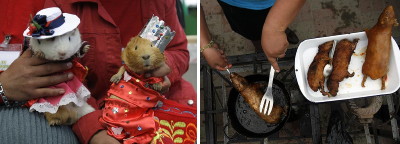
Posted By: Alex - Wed Jul 23, 2008 -
Comments (4)
Category: Animals, Food, Parades and Festivals

| Who We Are |
|---|
| Alex Boese Alex is the creator and curator of the Museum of Hoaxes. He's also the author of various weird, non-fiction, science-themed books such as Elephants on Acid and Psychedelic Apes. Paul Di Filippo Paul has been paid to put weird ideas into fictional form for over thirty years, in his career as a noted science fiction writer. He has recently begun blogging on many curious topics with three fellow writers at The Inferior 4+1. Contact Us |


